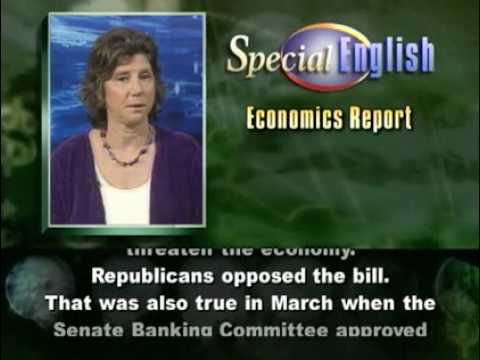Reform of Financial System Is Obama's Next Goal in Congress
 |
This is the VOA Special English Economics Report, from voaspecialenglish.com | facebook.com/voalearningenglish
President Obama turned his attention to financial reform after his victory in March on health care.
On April fourteenth he met with congressional leaders from both parties at the White House.
He said there are some areas on which Democrats and Republicans can agree. "If theres one lesson that weve learned," he said,
"it's that [an] unfettered market where people are taking huge risks and expecting taxpayers to bail them out when things go sour is simply not acceptable."
Treasury Secretary Tim Geithner wrote in the Washington Post that the deep financial crisis is close to the end. But he said the nation must not forget the near-collapse of the banking system in two thousand eight without fixing the causes.
He told the American Society of News Editors in Washington that no one is arguing against new financial protections. The debate now,
he said, involves how to design a system that lets big financial companies fail without harming the economy.
In December, the House of Representatives passed the
Wall Street Reform and Consumer Protection Act. That bill would create a new consumer financial protection agency. It would also increase investor protections and let shareholders vote on the pay of top company officials.
And it would create a group to identify and regulate companies that are so big, their failure could threaten the economy.
Republicans opposed the bill. That was also true in March when the Senate Banking Committee approved its own version. That bill would not create an independent consumer agency, but instead a new office at the Federal Reserve, the central bank.
Senate Minority Leader
Mitch McConnell of Kentucky said the bill would make future bailouts
more likely, not less likely.
Both measures in Congress call for
a system to supervise derivatives. These contracts are used for different purposes, including investment and protecting against loss. The largely unregulated market in derivatives is estimated at
six hundred trillion dollars.
Government rescues of banks considered "too big to fail"
angered the public and helped fuel a conservative movement.
The Tea Party also opposes the new health care law and argues for lower taxes and less government.
On April fifteenth they protested to mark Tax Day, when Americans have to pay any federal taxes they owe.
And that's the VOA Special English Economics Report.
(Adapted from a radio program broadcast 16Apr2010)
|




